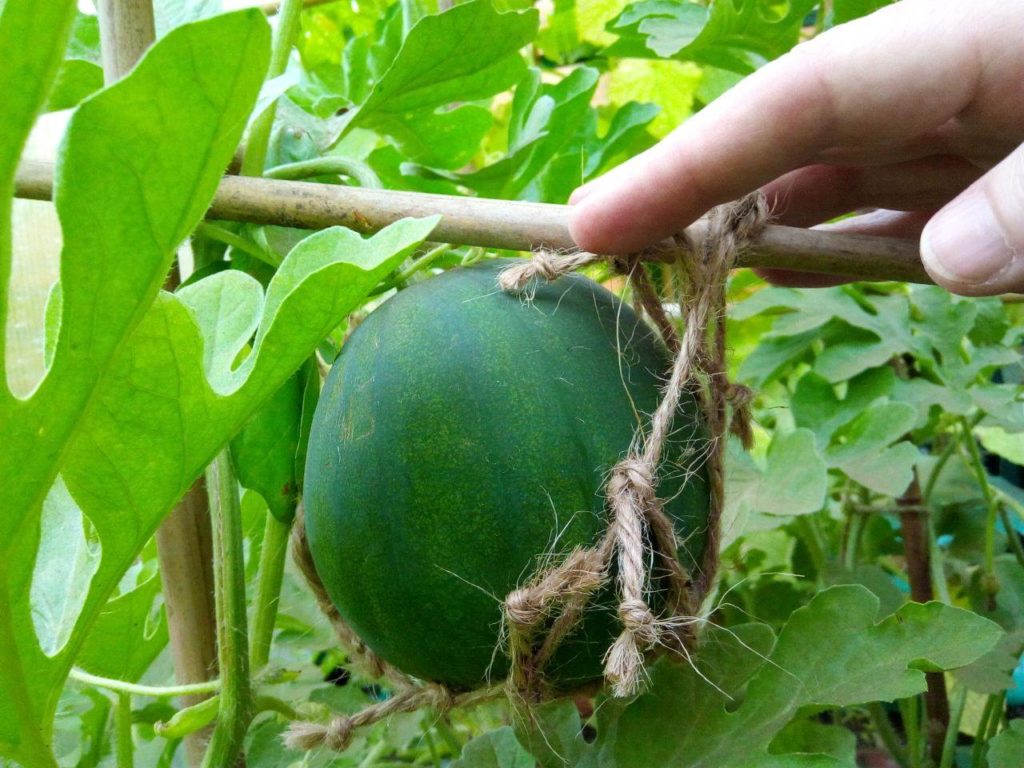Absolutely gerbils can eat fresh watermelon just like us humans. It is a very basic fruit with no complex mineral content or sugars to worry about. It isn’t acidic either.
There may be issues feeding too much of it if your gerbils have pre-existing conditions (such as kidney disease) – as with any natural food – but giving a small triangle of home-grown or shop bought watermelon to your Mongolians should quite simply just be a testy treat.
And tastes good for us humans too!
Watermelon Facts For Your Gerbils:
As a member of the cucumber family (curcubitaceae) – we know that this plant creates watery-succulant and brightly coloured vine-like plants. This family of plants also include all the squashes, pumpkins and all other melons – basically bright orange, yellow, red and green juicy fruits.
This tropical and temperate plant produces a huge fruit (in this plant group it is actually called a ‘pepo’). Unlike other family members with a outer green shell – this melon has an amazingly bright red centre with huge black pips. The watermelon really is a unique fruit.
Watermelons are however available in all sorts of other colours – including yellow, orange and even black (although that would be weird?). They have also been bred to be as large as 150kg (330pounds) for world records – but my home grown ones weren’t much bigger than a baseball!
Nutrition-wise they are around 90% water and so ergo – low calorie: great for a healthy gerbil treat. They still contain various vitamins (most noticeably Vitamin A and C), minerals (mainly potassium) and phytochemicals (including lycopene – the thing that makes red fruits red) that are often seen as a better choice than a commercial treat.
They are usually only found as whole fruits in the stores – but you can grow your own – so what about all the different parts and types of watermelon treats for rats – are they safe?
So, Can Gerbils Eat All Types Of Watermelon?
Fresh Flesh is usually the best (most fruit is best fed whole and naturally. Cutting a whole watermelon into teeny gerbil-sized cubes is the best way to feed them – but can get messy – so make sure you aren’t feeding these in the main enclosure or you could get mold growing from the left-overs.
Unlike a lot of fruits, the juice isn’t sticky though – as they are very low sugar – but they are SO juicy that you can guarantee they will have wet arms and faces by the time they have finished!
Dried Watermelon isn’t really a thing – as when you dry fruit – your take away the moisture. And as watermelon is over 90% water – you really wouldn’t have anything left?
You may find watermelon candy and chews – but – as with all candy – these likely contain many other less-nutritious (or man-made) ingredients to get that pink watermelon ‘look’.
We can also probably guarantee that none of the extra ingredients will be as healthy as the fresh fruit itself either. It will most likely say ‘watermelon flavor’ anyway – meaning it doesn’t even have to contain ANY watermelon at all (that’s the laws we live with!
Roasted Watermelon however, IS a thing – and gently roasting or grilling large slices of watermelon is really a thing? It doesn’t gain or lose any key nutrients either way as it doesn’t really have any in the first place – it just mixes up the feel and temperature of the fruit.
Watermelon Desserts & Smoothies are all fine – as long as the other fruits and ingredients in the dish are also gerbil-safe – and nothing is too concentrated or processed. Always remember dried fruits (like raisins) will always contain higher sugar concentrations than the fresh fruit they were made from.
Can Gerbils Eat Other Parts Of The WaterMelon Plant?
So, you decided to grow them yourself and were wondering about feeding your pets more natural things – so let’s have a closer look;
Watermelon Skins – these are usually thick and pretty tasteless – but not harmful. So if you wanted to feed your gerbil clan a whole chunk of watermelon to share instead of tiny pieces each, then totally you can give them the whole section. They most likely won’t eat the flesh – but it is edible for humans (although we usually pickle it first).
Watermelon Pips – totally safe – they are just like any other curcubite pips – best dried and roasted though (for us humans for sure as they can be quite nutty indeed) – but raw isn’t an issue at all for your gerbils – they wil only eat the bits they like anyway – and with tiny tummies – they won’t waste space on the boring bits?
Watermelon Flowers – these are so tiny – but usually in great numbers early on in the plant’s growth. You will want to only feed the ‘male’ flowers (as you need the female ones to produce the fruits obvs), but they are easy to tell apart – so this shouldn’t be a problem.
Watermelon Leaves and Vines – although they look awesome with their unique shape leaves and crazy tendrils – just like most other vines in their family – they are spiky! Not really bad like brambles, but you will certainly get a scratch from them. Perhaps not best to feed them to your rats as there is nothing to say that they are safe if digested: there are notes to say that young leaves and vine tips of squash and cucumbers are safe – but nothing on watermelons that we could find – so best avoid.
